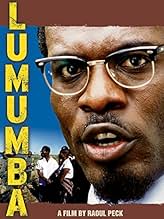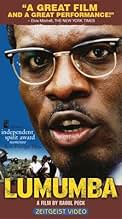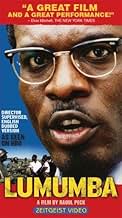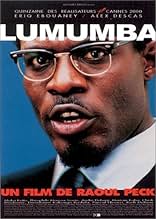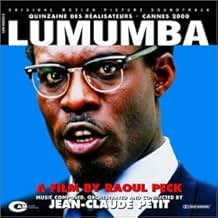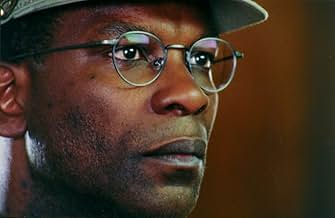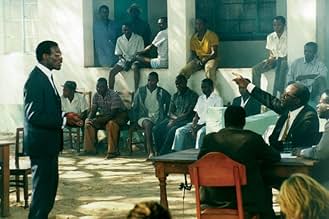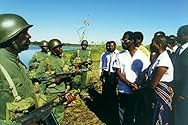AVALIAÇÃO DA IMDb
7,2/10
2,2 mil
SUA AVALIAÇÃO
Adicionar um enredo no seu idiomaThe true story of controversial leader of independent Congo Patrice Lumumba.The true story of controversial leader of independent Congo Patrice Lumumba.The true story of controversial leader of independent Congo Patrice Lumumba.
- Direção
- Roteiristas
- Artistas
- Prêmios
- 3 vitórias e 8 indicações no total
Théophile Sowié
- Maurice Mpolo
- (as Théophile Moussa Sowie)
Makena Diop
- Thomas Kanza
- (as Oumar Diop Makena)
Dieudonné Kabongo
- Godefroid Munungo
- (as Dieudonné Kabongo Bashila)
Pascal N'Zonzi
- Moïse Tshombe
- (as Pascal Nzonzi)
- Direção
- Roteiristas
- Elenco e equipe completos
- Produção, bilheteria e muito mais no IMDbPro
Avaliações em destaque
10Anyanwu
This movie is the best movie I have seen in a long time. It is also the best movie seen that uses a drama to tell history, without going to speculation such as with JFK,Nixon or Hoffa. It deftly depicts the clutches that Belgium had on the Congo. It also teases out easily for us the European and American forces that were behind the power the inflict the Congo today. The film was sure to specifically implicate the U.S., rightly so, in the murder of Lumumba. This film could never be made in the U.S. for U.S. film rarely criticizes itself in acts of imperialism and murder. (Save Stone's JFK) It also lets us in on the problems that were present with the inner conflict of the Congo, between Lumumba, Mobutu and Katanga. We can see how precarious countries sit in establishing new governments when their history is one of colonization and those who were the colonizers continue to pull the strings of power and force. The film is excellently shot with Eriq Ebouaney an excellent Lumumba. The cast is great and they really draw you into the feeling of the climate in the Congo during that time.
Again, this is a must see for those who love drama with a correct historical background. See my notes on Quilombo.
Again, this is a must see for those who love drama with a correct historical background. See my notes on Quilombo.
9imxo
To answer the question of a previous reviewer who asked the name of the U.S. official mentioned in "Lumumba", the name of the character is "Mr. Carlucci." Frank Carlucci is reported as having been at that time Second Secretary at the U.S. Embassy in the Congo. Subsequently, among other assignments, he was appointed U.S. Ambassador to Portugal, Deputy Director of the Central Intelligence Agency, Secretary of Defense, and is now the Chairman of the Carlyle Group. It's hardly surprising that Carlucci's biographical sketch on his www.carlylegroup.com web site fails to credit his service in the Belgian Congo. If his name was deliberately censored from the HBO version of "Lumumba" it may have been to avoid the possibility of HBO's being sued in U.S. courts. Carlucci's name, however, is clearly mentioned in the theatre version of "Lumumba" that I saw recently. In the event, I expect that he would deny any involvement in Lumumba's murder.
Others have commented on the evenhandedness with which the film "Lumumba" treats the parties concerned: Lumumba-supporters, other Congolese, even Belgians. A somewhat more sinister view emerges, I think, from the BBC documentary entitled "Who Killed Lumumba?", based on the book "The Murder of Lumumba" by Belgian historian Ludo de Witte. When examined closely, these films demonstrate that the fate of Lumumba and the history of the Congo is not just a matter of black and white. Only Lumumba's murderers believe that.
Others have commented on the evenhandedness with which the film "Lumumba" treats the parties concerned: Lumumba-supporters, other Congolese, even Belgians. A somewhat more sinister view emerges, I think, from the BBC documentary entitled "Who Killed Lumumba?", based on the book "The Murder of Lumumba" by Belgian historian Ludo de Witte. When examined closely, these films demonstrate that the fate of Lumumba and the history of the Congo is not just a matter of black and white. Only Lumumba's murderers believe that.
This film has both people that enjoy and people that loathe it. However I was struck by the fact at how many non-Africans had seen and commented on this film. Here we see a massive problem arising.
Firstly: It is a fact that African history was passed along orally and the only real written history in Africa was created with the advent of missionaries on the continent. To this day there are more books written about African history by non-Africans than there have been of Africans. This means that Africa has seldom, if ever, been presented the way it sees itself. "Lumumba" is a film made by an African filmmaker, shot on the African continent with African actors and yet we see Americans and Europeans commenting on it!
The fact is that most of these people have an imagined history of Africa. On user commented that the USA was 'forced' to intervene in Congo, because "Lumumba" called in the USSR to help out his army. What the hell was the USA doing in Africa in the first place? And I answer; they were securing their economic interests. How dare outside powers even allow to excuse their intervention in the African continent, when they are in majority at fault for the situation many African countries find themselves in today.
Secondly: There were a couple of comments on the acting and style that this film was made in. Many people don't realize that the entire world does not exclusively copy the Hollywood model. We see different characters in different environments. "Lumumba" shows a different view on an African hero and even though this view is not entirely accurate, what view ever is.
So don't watch and judge this film according to your standards, because you most likely have no idea what you are talking about. Rather than being prejudiced towards the film, just let it talk to you and present you with its argument...for a change!
Firstly: It is a fact that African history was passed along orally and the only real written history in Africa was created with the advent of missionaries on the continent. To this day there are more books written about African history by non-Africans than there have been of Africans. This means that Africa has seldom, if ever, been presented the way it sees itself. "Lumumba" is a film made by an African filmmaker, shot on the African continent with African actors and yet we see Americans and Europeans commenting on it!
The fact is that most of these people have an imagined history of Africa. On user commented that the USA was 'forced' to intervene in Congo, because "Lumumba" called in the USSR to help out his army. What the hell was the USA doing in Africa in the first place? And I answer; they were securing their economic interests. How dare outside powers even allow to excuse their intervention in the African continent, when they are in majority at fault for the situation many African countries find themselves in today.
Secondly: There were a couple of comments on the acting and style that this film was made in. Many people don't realize that the entire world does not exclusively copy the Hollywood model. We see different characters in different environments. "Lumumba" shows a different view on an African hero and even though this view is not entirely accurate, what view ever is.
So don't watch and judge this film according to your standards, because you most likely have no idea what you are talking about. Rather than being prejudiced towards the film, just let it talk to you and present you with its argument...for a change!
This movie was intended to explore the powers that resisted and ultimately ended Lumumba's political movement in the Congo with historical accuracy. Although it goes to great lengths to meet that end, it falls horribly short in two major ways. One, the CIA is mentioned just one time. Two, JFK is portrayed as though he authorized Mubutu's "offer" of a military takeover. This is despite the fact that Lumumba was killed three days before JFK became president! With the information now available (read JFK: Ordeal in Africa by Richard Mahoney), there is no doubt that the Dulles brothers using the CIA were chiefly responsible for Lumumba's assassination. Kennedy was heartbroken by the news and understood and advocated for a united Congo much like Lumumba did, opposing Eisenhower and the CIA. Not to mention the Belgians and British. Although one could argue these points do not have a major impact on the movie, they are critical to understanding not just the Congo during that period, but the intense internal conflict in the United States between large interests (Wall Street represented by CIA) and JFK's vision for the world (third world independence and development, anti-imperialism).
I just saw this movie last night, 2/21/02, on HBO TV in New York and noticed a fascinating and rare bit of censorship within it. In one late scene in the movie when Congo politicians and 1-2 Americans meet around table and vote whether Lumumba is to be captured/killed, the apparent American, perhaps a CIA officer, is addressed by Gen. Mobutu and asked how he wants to vote. But the American's name uttered by Mobutu is bleeped out in the televised version I saw and heard. Then in the film's final credits, this same character's name is masked over and appears only as "Mr......" played by actor Dennis Thatcher. So what IS the name of the mysterious man, no doubt too accurately identified, in this movie, airing on American TV some 2 years after it was made.
Você sabia?
- CuriosidadesRaoul Peck had already made a film about Lumumba in 1992: the documentary Lumumba, a Morte do Profeta (1991).
- Erros de gravaçãoWhen Lumumba arrives at Brussels airport for a round table conference, an Airbus A300 and Lockheed C-141 Starlifter can clearly be seen. Both of these aircraft had not yet entered into service and flown at the time the event took place in 1960. Airbus A300 made its first flight on 28 October 1972, twelve years later; and Lockheed C-141 Starlifter made its first flight on 17 December 1963, three years after the conference.
- Citações
[first lines]
Patrice Émery Lumumba: [voice over narration] You never knew about that night in Katanga. No one was to know.
- Versões alternativasFrank Carlucci, who was second secretary at the U.S. embassy in the Congo at the time of Lumumba's assassination, is portrayed in one scene discussing the murder with U.S. Ambassador Clare Timberlake and several Belgian and Congolese officials. Carlucci threatened to sue U.S. distributor Zeitgeist Films if his name was not removed from the movie. Zeitgeist was too small to fight any potential lawsuit, so all non-theatrical U.S. releases of the film (including the version shown on HBO and potential VHS and DVD releases) have Carlucci's name bleeped from the dialogue and masked in the closing credits.
- ConexõesFeatured in Extermine Todos os Brutos: Who the F*** is Columbus? (2021)
Principais escolhas
Faça login para avaliar e ver a lista de recomendações personalizadas
- How long is Lumumba?Fornecido pela Alexa
Detalhes
Bilheteria
- Faturamento bruto nos EUA e Canadá
- US$ 352.296
- Faturamento bruto mundial
- US$ 352.296
- Tempo de duração
- 1 h 55 min(115 min)
- Mixagem de som
Contribua para esta página
Sugerir uma alteração ou adicionar conteúdo ausente


